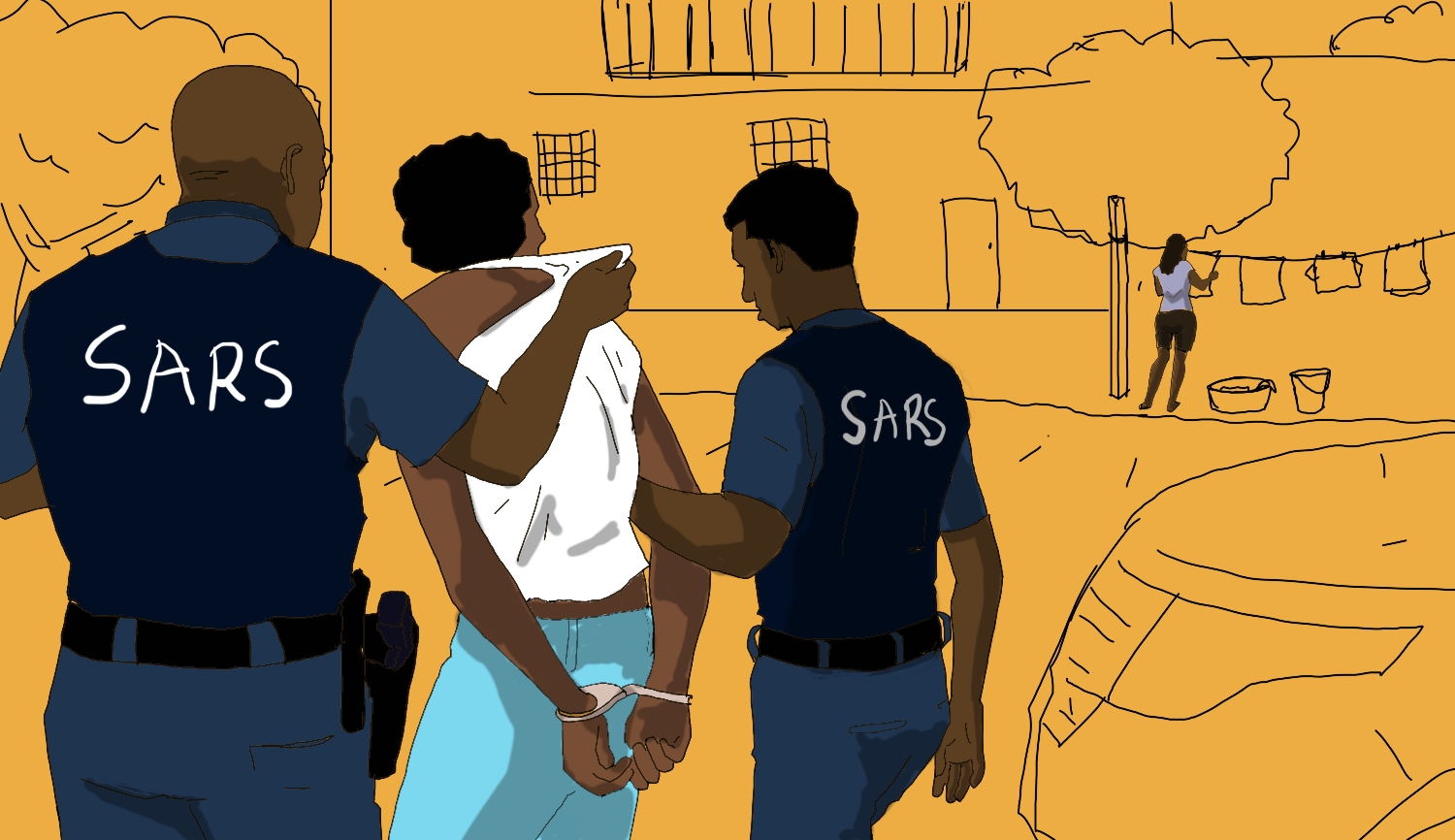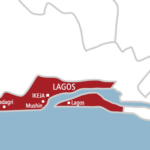When a young video game repairer found himself on the radar of SARS, the drama that unfolded had all the intrigue of an action video game – except instead of the fun, it was all fear and frustration.
Henry Ifeanyi, a video games repairer in New Haven, a suburb of Enugu, shares his story below.
- Opposers of southern Governors’ ban on open grazing have hidden agenda — Ortom
- Kidnappers of Ondo pastor demand N30m ransom
My SARS experience cannot be described as a story. It was a nightmare. In my 30 years of living, this experience counts as one of, if not the worst.
At about 6 am on February 8, 2017, I was forced out of sleep by a loud bang on my door. Six men wielding guns barged into my room, knocking down the door in the process. They ordered me to lie on the floor. I obeyed. I thought they were armed robbers. I had no money in the house and feared I would be relieved of my phone and beaten instead.
The men wanted to know the number of people in the house, and I told them it was just me. They seized my phone and ordered me to stand. They ransacked the house while I watched on and, after they found nothing of importance, asked me to put on my clothes, get the keys and lock the door.
Although at this point I feared the men might be kidnappers, I obeyed without hesitation because I was overwhelmed by fear and confusion. I could not think straight and certainly, could not afford the time and concentration to guess who they were. The men helped me fix the door they had kicked down. Then they went out with me and locked it.
Outside, I saw a lady. I did not recognize her. It was odd how she had bent her head downwards, as though she did not want me to recognize her. Another person I remember seeing while being taken away was my female neighbour, who works in a bank. She had come out to wash her clothes, only to see me being taken away.
I noticed at a point that the men’s guns were taped with colours identifiable with the Nigeria Police Force (NPF) – blue, yellow and green. But that was not enough to calm my nerves.
I asked the men where they were taking me. As an answer, one of them, who I later learnt was called Bassy, slapped me. “If you knew where you were going, you would just keep quiet,” he said.
The weight of that slap, coupled with how threatening the men looked, made me swallow all my complaints. The men wore mufti and, though I was unsure if they were police officers, I followed them to avoid being assaulted any further.
They took me to their parked car and deliberated on whether to throw me into the boot of the car or not before deciding to handcuff me and let me sit in the car with them.
I noticed another car apart from the one they had made me board. Some of the men, in the company of the mysterious lady I had seen earlier, entered this other car.
Soon, both cars drove off.
During the ride, the driver asked me a question: “Where is Darlington?”
Darlington was a friend of mine who had stayed in my house for about three weeks. I’d known Darlington, who owned a boutique in Delta state, for over seven years and often repaired his video games. After his stay at my place, Darlington had gone to Lagos, where he said he needed to meet someone.
The men checked my phone. They scrolled through call logs and read text and WhatsApp messages, confirming that the last time Darlington and I spoke was when he had called to tell me he had arrived in Lagos.

Meanwhile, as the car went farther away from the places I knew, my fears intensified.
The men began sharing stories of people they had killed and the cruel things they had done in the past. I was not sure whether those were true stories or lies meant to scare me. I noticed that one of the men kept receiving text messages of people’s details. I wondered if that was the way the men had found me too.
Many times, my phone rang with calls and beeped with messages. I figured that someone had told my family members about what had happened to me. I suspect some of the calls were also from my clients – I had some meetings scheduled for the next morning. The officers refused to allow me answer a single call.
By this time, the cars had left Enugu State and entered Anambra State. We drove into Awka, Anambra’s capital city, and drove out of it, journeying farther into places that were not familiar to me.
Soon, we reached our destination: Anambra Police Station in Awkuzu. This was when I realized the men were officers of the Special Anti-Robbery Squad (SARS) in Awkuzu. Awkuzu is a town in the Oyi Local Government Area of Anambra State.
As I was being led through the hallway of the building, I began to remember the numerous gory stories I had heard about the Awkuzu SARS unit, ranging from killings to torture.
The men took me to the office of the Commanding Officer. The Commanding Officer asked me where Darlington was. I told him what I had told the men: Darlington was in Lagos. The Commanding Officer told the men to get prepared because they were leaving for Lagos that same day to look for Darlington.
The men took me to a room, handcuffed me to a chair and told me to sit on the floor. I sat. They left me and went out. At 11 a.m., they returned and told me it was time to go to Lagos.
That was how I travelled with the SARS officer to Lagos on the same day I was arrested.
We left the mysterious lady at the station and drove out in two cars. I was told to call Darlington and ask if I could stay at his house in Lagos as I was on my way there to buy some electronics and would need accommodation. Darlington agreed. I felt bad having to contribute to a plan to trap Darlington; not least because I sensed the SARS men were up to no good.
At this point, I noticed my body and breath had begun to stink as I was yet to take a bath or brush my teeth since that rude awakening by the SARS officers back home.

My phone also kept buzzing with calls, and each time it did, the SARS men would ask me to identify who it was. To them, I ended up identifying a customer, my mum, and two of my brothers.
It was 7 pm when we arrived in Lagos that same day. I called Darlington, who said he couldn’t come and pick me up as it was late. Darlington however proposed to send me the contact number of somebody who lived nearby and who would accommodate me in his place.
The SARS officers told me to agree to the new plan.
I called Darlington’s contact, who told me Darlington had already called and told him to expect my call. The person’s name was Daniel. Daniel told me he was cooking, but he would wrap it up so he could come to pick me.
The SARS men told me they would shoot Daniel if he ran or did anything outside the plan. They also promised to let me go if they caught Daniel. They removed the handcuffs from my hands and stood aside, watching.
Soon afterwards, I saw a man alight from a bike. I called Daniel’s number and this man answered. Daniel came close to me – and that is when the SARS officers grabbed him.
Daniel was shocked. He tried pushing the SARS officers off him. But the officers started to beat him.
The SARS officers put handcuffs on Daniel’s hands and pushed him into the car. He looked really confused. I felt even worse about the situation and had to tell him I had had no choice but to do as the SARS officers had directed; that it was not personal or intentional.
The SARS officers took Daniel and I to a hotel, where we lodged.
Inside the room, the officers told us to sit in a chair close to the window. We were then handcuffed to the window. By this time, I was weak and hungry. Daniel and I slept in the chair, while the officers slept on the bed.
On the morning of February 9, 2017, the SARS officers told Daniel and I that their main interest was Darlington and that it would be best for us both to come up with an idea that would help them trap their target, else whatever Darlington did would be on our heads. They said they would release us if we helped them catch Darlington. We started to rack our brains as to how we would make that happen.
Soon, a plan was hatched.
The SARS officers told Daniel to call Darlington and tell him that he and I wanted to hang out with him. Daniel made the call. Darlington agreed. Darlington was in Lekki and asked Daniel and I to come over.
All through the ride, the SARS officers kept promising us freedom if they managed to catch Darlington.
We made calls to Darlington and got him to come to a street in the Lekki area, where he was arrested by the SARS officers.
The officers asked Darlington where he was staying, and he said he was squatting in somebody’s apartment. They asked him to take them there, and he did.
There were two men in that apartment. The SARS officers handcuffed them, too. They asked the men where their car was and they pointed at it – a Mercedes Benz. Some of the SARS officers got into the car, together with the two men found at the apartment.
The convoy of three cars headed back to Awkuzu.
Along the way, the tires of one of the cars burst. Everyone slept on the road that night. The following morning, the journey to Awkuzu continued.
At Awkuzu, the Commanding Officer demanded that all of us – Darlington, Daniel, the two other men and I – write statements. Daniel complained: Hadn’t the officers promised to let us go if we delivered Darlington? The officers started to beat him, and I used his experience to advise myself against complaining too. I didn’t want to add wounds to my hunger.
The SARS officers were the ones who eventually wrote statements for all of us. They did not allow any of us to see what they had written.
Afterwards, I remember being led to a place called ‘torture room’; which housed different weapons – knives, hammers, and others. It was a scary sight.
The SARS officers claimed Darlington’s case was a special case, so they took him behind the torture room. A few minutes later, I heard Darlington screaming – a kind of deeply disturbing screaming I had never heard before.
When the SARS officers brought Darlington back, he looked drained of strength. “Where is the car?” I heard the SARS officers ask him.
The SARS officers then told us to take off our clothes. We did, leaving only our boxer shorts. I remember having my wallet on me. I also remember another SARS officer coming in and asking us to follow her, which we did.
I begged this SARS officer to give me some money from my wallet. I had 4,000 naira in there and wanted her to give me 2000. I had heard prison stories of old inmates beating up new inmates and wanted to equip myself against any such assault. The SARS officer said she would give me 500 naira and keep the rest for me until my release. I agreed.
I was put in Cell 2, home to at least 50 inmates.
The inmates told those of us who had just come into the cell that we needed to sing and dance for them as entertainment as part of our ‘initiation’ into the cell. Nobody was in the mood to sing or dance, but what had to be done had to be done. Imagine being in pain and being asked to forget all of that to make merry.
The cell stank. Its floor was concrete and dirty. At night, unwashed bodies piled on top of one another. I could barely believe what my eyes were seeing. Everything felt strange and cold.
Darlington was kept in another cell, so I could not see him again.
The old inmates took my 500 naira, then let me in on the rules and the culture of the cell.
There were leaders in the cell who made sure that everyone got a portion from what they (the leaders) collected from any other person.
If the leaders said, “This cell is locked,” it meant that every soul in the cell had to keep quiet. One day, those words were said and I flouted them by speaking to someone by my side.
I was immediately told to ‘mount the wall’ as punishment. ‘Mounting the wall’ meant facing the wall and pretending to climb it.
There were other code-words like MP3 and Woofer. When a leader said, “Give him MP3 or Woofer,” he was instructing the man in charge of torturing inmates to either slapping someone on the back or hit them hard. MP3 was to a slap as Woofer was to a punch.
After ‘mounting the wall’, I received three MP3s. The MP3s were so sound that I made sure it was the last time I disobeyed cell rules.
In terms of food, Garri was the meal of the cell. Three people shared a bowl of Garri. They would pour Garri into a bowl and ask everyone to wait until the Garri would swell. They drank Garri in the morning and, in the afternoon, ate a tiny portion of bread.
Some inmates had family and friends coming to see them bring them food. But nobody came for me, so I depended on whatever I could beg from the next inmate.
I remember forcing myself to sleep many times, even when I didn’t feel sleepy.
I met a boy who looked less than 18-years-old in the cell. The boy said he had been arrested by SARS because he stole 4,000 naira. He had wounds that looked infected all over his body.
Another inmate explained that his cousin had given him a phone and, unknown to him, the phone had been taken from someone who had been kidnapped. He was then traced and arrested by SARS.
Indeed, it seemed to me that most of the inmates were there due to unfair and unfortunate circumstances.
There was also a man, short in stature, who entertained inmates with stories of his adventures. But he was a mean and angry man. One day, he almost beat another inmate to death. I cannot remember exactly what the other inmate did but what I saw ensue between them was traumatizing.
I ended up spending seven days in the cell, alone, with no family or friend seeing me.
Anytime I saw a SARS officer and asked what was going on with my case, they would tell me to relax as investigations were ongoing. I was broken at a point.
One night, I remember, a gunshot rang out. In the morning, news spread that the SARS officers had shot somebody.
I also recall an unforgettable night when the SARS officers brought in new people into the cell. A headcount was taken and it showed there were ninety-two people inside a cell meant to accommodate only 20 persons.
On the seventh day of my stay in the cell, one of the SARS officers who went by the name Pele came and told me that I could bail myself if I had money. I agreed to his suggestion, being tired of the living conditions in the cell. Pele and three other officers—Naked Wire, Bassy and another officer whose name I’ve forgotten—brought me out from the cell.
“How much do you want,” I asked.
“100,000 naira,” they answered.
I could not afford that amount. I thus negotiated with them and they settled for 50,000 naira. I suggested making an online money transfer, but the officers rejected the idea; they wanted cash.
I was allowed to call a family friend called Emeka, who lived in Awka. I begged Emeka to come to my rescue at Awkuzu SARS. I assured Emeka that I had not done anything wrong; he just needed him to come and bail me. Emeka agreed.
I used my mobile phone to credit 55,000 naira to Emeka’s account and asked him to use 5,000 naira to cover his transport fare. Emeka brought the 50,000 naira to the SARS station. The SARS officers gave Emeka a bail bond to sign and he did. The officers told me I would have to come back later for documentation. I agreed.
The officers looked for my clothes at the counter but could not find them. They looked for my wallet, and couldn’t find it too. They gave me another person’s clothes to wear. I wasn’t given footwear.
It was night on Feb. 15, 2017, when I finally stepped out of the station. Emeka and I took a bike to Nnamdi Azikiwe University Junction, Awka. I struggled to secure a bus to Enugu and, while I stood by the roadside waiting for a bus, Emeka went home. By midnight, I was still stranded and desperate. I flagged down a bus carrying weave-on and told the driver about my predicament. The driver agreed to let me hitch a ride. I got to Enugu around 3 am.
When I stepped into the compound, my neighbours ran out to meet me, screaming in joy.
**

Before I left the SARS station, two of the officers had explained that they were only ‘doing their job.’ They gave me their numbers and told me to call them anytime I had any leads on drug dealers. They promised to give me a share of the money they would make. I cursed them a thousand times in my mind.
I took their numbers all the same, although I have since deleted them.
After my stay at Awkuzu SARS, I continue to live in fear, haunted by the experience, thinking they would come for me again. At some point in SARS custody, I genuinely thought I was going to die. I remember fearing that the officers would just bring out all the inmates one night and shoot us, leaving no trace or record of our lives.
Later, I found out that on the seventh day of my stay in SARS custody (which happened to be the day Pele came to meet me) my family had come with a lawyer to see me, but the officers had denied them access. The officers told my family and the lawyer to return the next day.
I also learnt that the officers had lied to my mother, telling her that they had been feeding me in the cell. They told her further that the cost of my feeding was either 5,000 naira or 10,000 naira. My mother, out of the relief of knowing I was alive and being well-taken care of, paid them 10, 000 naira.
Behind the scenes, I continued to suffer. Not even the SARS officer who took my wallet once gave me anything to eat or drink.
I believe the SARS officers preyed on my desperation to leave the cell. If I had known my family was to visit the next day, I would have stayed put and not caved in.
Anyway, do you remember the mysterious lady I had spotted on the morning of my arrest? She was apparently Darlington’s girlfriend. I later found out that she used to visit him during Darlington’s stay at my house in my absence.
The SARS officers had tracked the girl, caught her and asked her where Darlington was. She directed them to my house, and that is how my nightmare started.
I know the lady could have called Darlington directly but the thing is that SARS officers like to trap more than one person. Anytime they go to make an arrest, they like to take in the people who are with the target because that allows them to make more money through intimidation and extortion. They are not into law enforcement – they are into business.
I was later given the full story of the Darlington case: A car was stolen in Awka the same year I was arrested, and the camera that was in the car was given to Darlington to sell. Darlington sold it to someone who, when SARS tracked and caught, confessed that he got the camera from Darlington.
Darlington spent about two months and three weeks in SARS custody before being released. I still consider him a friend. Indeed, I am still on speaking terms not only with him but with Daniel too.
**
Meanwhile, I have been trying to mend broken relationships with my customers ever since my experience. Most of my clients grew impatient with me after I had failed to pick their calls or respond to their messages during my week-long SARS ordeal. Some have stopped doing business with me. A few have sympathized with me, while others have simply not cared.
My experience at the hands of SARS has changed me significantly. I have become increasingly insecure. I have also been trying to mend broken relationships with my customers ever since my experience. Most of my clients grew impatient with me after I had failed to pick their calls or respond to their messages during my week-long SARS ordeal. Some have stopped doing business with me.
During the #ENDSARS protests that swept across the country in October, I was proud to lend my presence and my voice, because the issue hit close to home.
When I heard people utter negative comments about those protesting, I found it interesting – if only they knew how it felt.
This story is part of a multimedia project by Tiger Eye Foundation and media partners across Nigeria, documenting police brutality in Nigeria, and advocating for police reform.

 Join Daily Trust WhatsApp Community For Quick Access To News and Happenings Around You.
Join Daily Trust WhatsApp Community For Quick Access To News and Happenings Around You.


